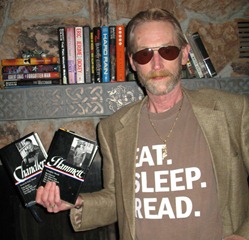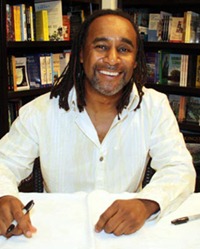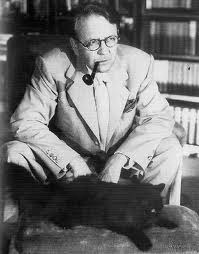 As a reviewer, and a rather “raw” one at that, I sneak around to what I consider the best review sites and sources to see how the pros do it. The New York Times Book Review being one of the Mecca’s of the craft. One thing I have found over the last couple of years of doing this is that I can’t follow any sort of set piece or outline. My review tend to be much longer than most out there. That said, I found a couple of insightful or at least interesting points in this excellent article…and a few where I nodded my head wisely. here’s a few of the highlights, and my thoughts on them. Click the link at the bottom of the page for the whole article which is interesting and entertaining.
As a reviewer, and a rather “raw” one at that, I sneak around to what I consider the best review sites and sources to see how the pros do it. The New York Times Book Review being one of the Mecca’s of the craft. One thing I have found over the last couple of years of doing this is that I can’t follow any sort of set piece or outline. My review tend to be much longer than most out there. That said, I found a couple of insightful or at least interesting points in this excellent article…and a few where I nodded my head wisely. here’s a few of the highlights, and my thoughts on them. Click the link at the bottom of the page for the whole article which is interesting and entertaining.
What do you look for in a good book review? Is there one review that you have written or read that you feel is somehow representative of an ideal review, a model for aspiring book reviewers?
Engagement, narrative drive, the weaving together of description and argument, at least some attention to the prose. I’m not a style fetishist, but I detest verbal automatisms and meaningless stock phrases like “this novel isn’t perfect.” (Is there another one that is?) I am also not a fan of “voice-y” writing, which often strikes me as lazy. We’ve published some fine reviews in my time. Some I especially admired: Stephen King on a biography of Raymond Carver, James Wood on Flaubert (which made it into his primer on fiction), Leon Wieseltier on Saul Bellow, Lee Siegel on Norman Mailer, Francine Prose on Hans Keilson, Donna Rifkind on Roger Rosenblatt’s new book, Rosenblatt’s own review of Ian Brown’s memoir. My own reviews tend to elongate into profiles or longer considerations, not a useful model for anyone, I’m afraid, but especially not for a younger reviewer getting her feet wet. I’m addicted to The New Republic and The New York Review of Books: I have been for 35 years, and tend to favor that mode of rigorous argument. I’m proud of having written for both.
This is something I strive for. Engagement. I try and write like I am talking to my audience instead of writing a paper or an assignment. I want the reader of the review to be as interested in reading the review as he or she might be in reading the book. I receive a lot of compliments on my reviews in the form of comments, here and at Amazon and more than one reader has told me they bought the book, at least in part, because of my review. I’m not trying to “sell the book” but rather interest the reader in reading and imparting what excites me, holds my interest or otherwise makes me think about the book I am reviewing. I hope I am successful, at least to some extent at this goal.
I, too, love to write about the ‘craft’ of the book. The prose, the narrative style, the use of genre tools, how the characters are developed, the sense of place that the author brings to the work. I try and keep this part of my reviews light and not convey or wander off too far in to academia, as I feel this can make a review dull and from experience I’ll stop reading reviews that get too dry in examining the craft, but I do like to talk about this part of the book.
When I decided to start writing reviews it was because I wanted to examine what it was about a book that “made it good’ as well as why other books just didn’t hold my interest, or even worse, had me tossing it as far as I could. So, being an engineer by trade, I broke it down to its component parts. Disassembled the book – or in reviewer parlance – deconstructed it. and a large part of what I found in this process is that the craft of writing was a major part of what made one book “good” and another “bad”. So, I like to touch on the craft of writing in my reviews.
I also hate “verbal automatisms and meaningless stock phrases like .” and try to avoid them.
Is there anything distinctive or unusual about your work space? Besides the obvious, what do you keep on your desk? What is the view from your favorite work space?
I work, by choice, in a hideous unfurnished basement “office” not far from the washer-drier. The walls are unpainted concrete. There’s a window above the desk that admits ground-level light. Sometimes a neighborhood cat, a calico, wanders by and peers in. The office itself is dismal, contiguous dusty crowded surfaces piled with slumping hills of books, file folders, the whole of it thoroughly disorganized. I’m always searching for a “document” I can’t find. Visitors are appalled, but I like it. Also, it’s poorly insulated. I’m content to freeze in winter and broil in summer. Physical discomfort concentrates the mind.
I always find this part of any Q&A interesting, like there is some magic bullet or magic desk to how a writer works. Hemmingway wrote standing up at a sort of podium. I actually tried this and devoted myself to trying it to the extent that I bought a podium at a yard sale. It didn’t work at all. Hemmingway also got out of bed at an early hour and went straight to writing and worked until noon, no matter how much he accomplished. Then he went to the bar. I’ve tried this, too, and the jury is still out as to how well it works….
 I write in three places. My desk, with my desktop PC, my ‘desk books’ (whisky optional)– a dictionary, a thesaurus, the Oxford Book Of Quotations, The Devil’s Dictionary (better known as the cynics bible) and Einstein’s Theories of Relativity (just in case I need to touch a bit of genius) I also usually have on my desk shelf a book or two that I have recently read that for whatever reason I go back to read parts of, or that I may have highlighted passages, quotes, etc.…that I may wish to refer to or include in a review. I also have found that these non reference or iconic books tend to be ones I am fascinated by a part of the craft – the authors use of dialogue, prose, an interesting or odd narrative style, things like that – these tend to rotate off the desk shelf onto bookshelves scattered around the house. The second place I write is in my hot tub, or as a call it, my office. two reasons for this. One, for therapy reasons I end up in the jetted tub a few time a week for my bad back. I used to just read there, but I built a kind of lap desk and write there as well. the third place is on a sort of pub table on my deck. During the summer moths of course, but my deck is real private and I find its almost as solitary as a formal office with a door to shut of all distractions, but even better because I can watch the deer wander out of the woods to feed in my pastures, the hawks hunt in the Douglas Firs, the flowers. Its just a real nice place to spread out and write.
I write in three places. My desk, with my desktop PC, my ‘desk books’ (whisky optional)– a dictionary, a thesaurus, the Oxford Book Of Quotations, The Devil’s Dictionary (better known as the cynics bible) and Einstein’s Theories of Relativity (just in case I need to touch a bit of genius) I also usually have on my desk shelf a book or two that I have recently read that for whatever reason I go back to read parts of, or that I may have highlighted passages, quotes, etc.…that I may wish to refer to or include in a review. I also have found that these non reference or iconic books tend to be ones I am fascinated by a part of the craft – the authors use of dialogue, prose, an interesting or odd narrative style, things like that – these tend to rotate off the desk shelf onto bookshelves scattered around the house. The second place I write is in my hot tub, or as a call it, my office. two reasons for this. One, for therapy reasons I end up in the jetted tub a few time a week for my bad back. I used to just read there, but I built a kind of lap desk and write there as well. the third place is on a sort of pub table on my deck. During the summer moths of course, but my deck is real private and I find its almost as solitary as a formal office with a door to shut of all distractions, but even better because I can watch the deer wander out of the woods to feed in my pastures, the hawks hunt in the Douglas Firs, the flowers. Its just a real nice place to spread out and write.
But, again, there are no magic places. Whatever ritual works for you and lets the words flow. still, I am always fascinated by how authors and writers work.
What is your favorite snack?
Twizzlers, the thick oversize orangey-red ones. I think they’re called peel-and-pulls. I eat them only at the office, however.
I think favorite snack probably is a subset of The Work Space, but mine happens to be a plate of cheese, or Red Vines and the ever present cup of coffee before noon and a cup of tea after noon – and of course, the occasional whisky when the sun is just right….ahem, but I find I snack more when I write, so instead of getting up and down, I lay these out near where I am going to write. I want to work this question into an interview from now on. Be interesting to hear what other authors snack on, sip on, etcetera, when they work.
Please recommend three books (not your own) to your readers.
Remembrance of Things Past by Marcel Proust, Nixon Agonistes by Garry Wills, and the last three “Rabbit” novels by John Updike.
I couldn’t possibly stop at three. my lists of “The Hundred Best of ________” anything always run to at least one hundred and ten with numerous addendums. but, I can recommend three authors (okay, probably more but I’ll try and restrain myself) that fascinate me, and for different reasons.
 One, Eric Jerome Dickey. His works are usually classified as “Urban Fiction” but they are so mush more than that. What draws me to his books is first, his craft is excellent. I am convinced he could take the most mundane subject, story or place and write it truthfully and faithfully and make it interesting simply because he is a master of the craft of writing. fortunately, he chooses mush more interesting subjects and though some of his work is indeed, “Urban Fiction”, he writes just as well in crime fiction, thrillers, relationships, erotica and practically every other genre. But it is the craft that goes into his writing that could serve as a text book. His plots are flawless and never weak. His character development is top drawer and there are no throw away characters. Every one is necessary and has something to impart to the story. His scenes, whether it is a bank robbery or a love scene are pretty near perfect. he writes dialog with the best of them, whether it is a juvenile, a female, a street kid or a corporate executive. he also writes characters who could be of any race. I sometimes will go back and try and figure out what a character is racially, and the character could be of any race or social background, yet they are not generic. that is a wonderful talent as I think it allows any reader to identify with the characters.
One, Eric Jerome Dickey. His works are usually classified as “Urban Fiction” but they are so mush more than that. What draws me to his books is first, his craft is excellent. I am convinced he could take the most mundane subject, story or place and write it truthfully and faithfully and make it interesting simply because he is a master of the craft of writing. fortunately, he chooses mush more interesting subjects and though some of his work is indeed, “Urban Fiction”, he writes just as well in crime fiction, thrillers, relationships, erotica and practically every other genre. But it is the craft that goes into his writing that could serve as a text book. His plots are flawless and never weak. His character development is top drawer and there are no throw away characters. Every one is necessary and has something to impart to the story. His scenes, whether it is a bank robbery or a love scene are pretty near perfect. he writes dialog with the best of them, whether it is a juvenile, a female, a street kid or a corporate executive. he also writes characters who could be of any race. I sometimes will go back and try and figure out what a character is racially, and the character could be of any race or social background, yet they are not generic. that is a wonderful talent as I think it allows any reader to identify with the characters.
 Author two: has to be James Ellroy. the “Demon Dog Of Crime Fiction” First, he writes in my favorite genre; crime fiction, and not just any crime fiction but a decidedly ‘noir-ish’ mode. Secondly, he developed a style of writing along the way, which I believe will be studied in colleges and writing classes for a long time to come. His dense plotting and a relentlessly pessimistic, cynical, yet moral worldview, his dialog and narration often consists of a "heightened mix of jazz slang, cop patois, creative profanity and drug/street vernacular with a particular use of period-appropriate slang. He often uses a stripped-down staccato sentence structures, a style of "direct, shorter-rather-than-longer sentence that are declarative and ugly and right there, punching you in the nards. he says this signature style is not the result of a conscious experimentation but of chance and came about when he was asked by his editor to shorten his novel White Jazz from 900 pages to 350. Rather than removing any subplots, Ellroy achieved this by eliminating verbs, creating a unique style of prose. Maybe it’s the engineer in me that makes me admire a unique, new way of using the same familiar parts – words, genre, characters. While each sentence on its own is simple, the cumulative effect is a dense, baroque style.
Author two: has to be James Ellroy. the “Demon Dog Of Crime Fiction” First, he writes in my favorite genre; crime fiction, and not just any crime fiction but a decidedly ‘noir-ish’ mode. Secondly, he developed a style of writing along the way, which I believe will be studied in colleges and writing classes for a long time to come. His dense plotting and a relentlessly pessimistic, cynical, yet moral worldview, his dialog and narration often consists of a "heightened mix of jazz slang, cop patois, creative profanity and drug/street vernacular with a particular use of period-appropriate slang. He often uses a stripped-down staccato sentence structures, a style of "direct, shorter-rather-than-longer sentence that are declarative and ugly and right there, punching you in the nards. he says this signature style is not the result of a conscious experimentation but of chance and came about when he was asked by his editor to shorten his novel White Jazz from 900 pages to 350. Rather than removing any subplots, Ellroy achieved this by eliminating verbs, creating a unique style of prose. Maybe it’s the engineer in me that makes me admire a unique, new way of using the same familiar parts – words, genre, characters. While each sentence on its own is simple, the cumulative effect is a dense, baroque style.
 Third, has to be Ernest Hemmingway. his short, economical style – which he said he took directly from the Kansas City Star style book – probably influenced the style of more 20th century writers than any other author. Then there was the adventurous life he led which became a persona. No matter how many parodies are produced at his expense, it is harder to find works that were as socially conscious as A Farewell To Arms which described the impact of war on the psyche of those who fight it. Or the disillusionment with one’s own beliefs as was portrayed in For Whom The Bell Tolled which continues in its graphic description of war, the ugliness and brutality visited upon the innocent and defenseless - shattered by rape, slaughter for the sake of slaughter – but also how it can call to question ones own life view, faith and personal courage. In short, Hemmingway wrote books that weren’t just macho, or weren’t just ‘style’ but that examined a generations and that generations motivations.
Third, has to be Ernest Hemmingway. his short, economical style – which he said he took directly from the Kansas City Star style book – probably influenced the style of more 20th century writers than any other author. Then there was the adventurous life he led which became a persona. No matter how many parodies are produced at his expense, it is harder to find works that were as socially conscious as A Farewell To Arms which described the impact of war on the psyche of those who fight it. Or the disillusionment with one’s own beliefs as was portrayed in For Whom The Bell Tolled which continues in its graphic description of war, the ugliness and brutality visited upon the innocent and defenseless - shattered by rape, slaughter for the sake of slaughter – but also how it can call to question ones own life view, faith and personal courage. In short, Hemmingway wrote books that weren’t just macho, or weren’t just ‘style’ but that examined a generations and that generations motivations.
 And keeping with my reputation for lists that run longer than the stated number of inclusions, I’ll finish with Raymond Chandler, of course, who took “ a cheap, shoddy and utterly lost kind of writing, and have made of it something that intellectuals claw each other about?"
And keeping with my reputation for lists that run longer than the stated number of inclusions, I’ll finish with Raymond Chandler, of course, who took “ a cheap, shoddy and utterly lost kind of writing, and have made of it something that intellectuals claw each other about?"
Anyway, I found this article interesting and hope you will to. Here’s the link to it in its entirety.
Inside the NYT Book Review: ‘How I Write’ Interviews Sam Tanenhaus - The Daily Beast
Copyright © 2012 Robert Carraher All Rights Reserved

No comments:
Post a Comment